苏教译林版初中英语七年级上册 Unit 4 知识汇总
译林版英语七年级上册第四单元语法课件

19
We put an adverb of frequency before a verb except when it is the verb ‘to be’.
I always am happy. I am always happy. He often goes home by bike. He goes often home by bike.
17
Complete exercises (on page48 ) then check answers.
1)Simon loves playing football. He often plays football in the playground.
2)Sandy doesn’t have much time to play tennis. She seldom plays tennis.
14
我们可以使用频度副词来表示做某件事的频率。
1. My aunt cleans the room every day. She always does the cleaning.
2. My uncle goes to the Singing Club five times a week. He usually sings songs after work.
6. My cousin is a good boy. He never plays tricks
on his Dad.
15
Look and fill in the blank
SMADKiamainlinltdoyitienyellikes gdsowpaeplnisamlcayrisnoys lsgabflo.efaStordehotrsmbetkbsaiacnaltlhltilaon.fnogtl.de.Srahnscech’esonoaolf.tevrery gsocohdooalt. it.
译林版初中英语七年级上册期中复习Units1-4单元知识点梳理归纳
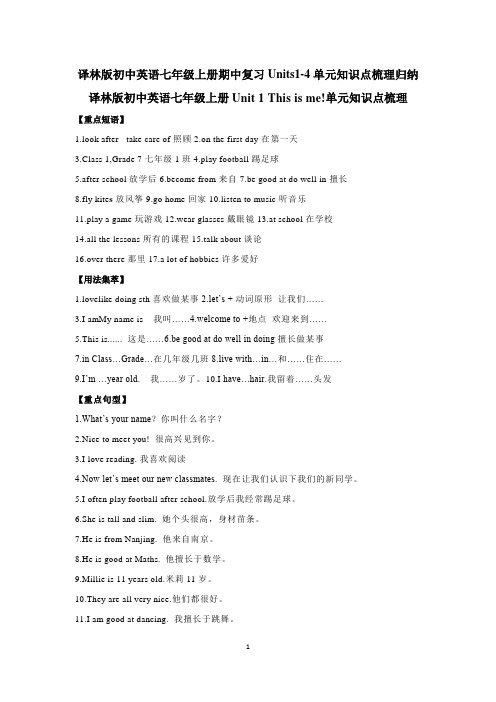
译林版初中英语七年级上册期中复习Units1-4单元知识点梳理归纳译林版初中英语七年级上册Unit 1 This is me!单元知识点梳理【重点短语】1.look after take care of 照顾2.on the first day 在第一天3.Class 1,Grade 7 七年级1班4.play football 踢足球5.after school 放学后6.become from 来自7.be good at do well in 擅长8.fly kite s 放风筝9.go home 回家10.listen to music 听音乐11.play a game 玩游戏12.wear glasses 戴眼镜13.at school 在学校14.all the lessons 所有的课程15.talk about 谈论16.over there 那里17.a lot of hobbies 许多爱好【用法集萃】1.lovelike doing sth 喜欢做某事2.let’s +动词原形让我们……3.I amMy name is 我叫……4.welcome to +地点欢迎来到……5.This is...... 这是……6.be good at do well in doing擅长做某事7.in Class…Grade…在几年级几班8.live with…in…和……住在……9.I’m …year old. 我……岁了。
10.I have…hair.我留着……头发【重点句型】1.What’s your name?你叫什么名字?2.Nice to meet you! 很高兴见到你。
3.I love reading. 我喜欢阅读4.Now let’s meet our new classmates. 现在让我们认识下我们的新同学。
5.I often play football after school.放学后我经常踢足球。
译林版七年级英语上册第四单元知识点总结
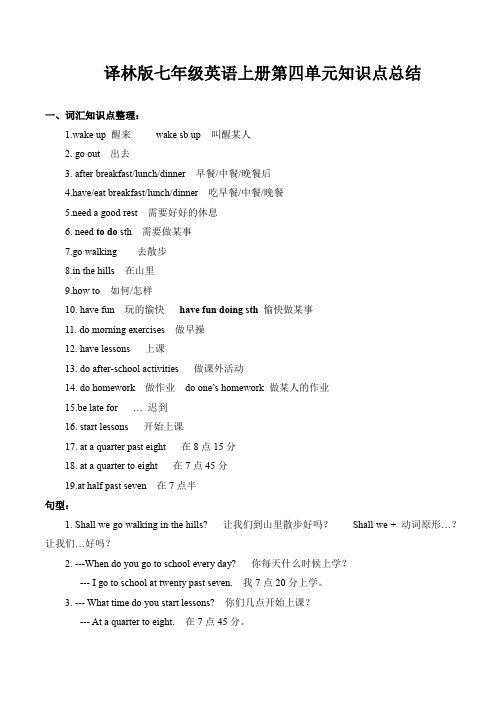
译林版七年级英语上册第四单元知识点总结一、词汇知识点整理:1.wake up 醒来wake sb up 叫醒某人2. go out 出去3. after breakfast/lunch/dinner 早餐/中餐/晚餐后4.have/eat breakfast/lunch/dinner 吃早餐/中餐/晚餐5.need a good rest 需要好好的休息6. need to do sth 需要做某事7.go walking 去散步8.in the hills 在山里9.how to 如何/怎样10. have fun 玩的愉快have fun doing sth愉快做某事11. do morning exercises 做早操12. have lessons 上课13. do after-school activities 做课外活动14. do homework 做作业do one’s homework 做某人的作业15.be late for … 迟到16. start lessons 开始上课17. at a quarter past eight 在8点15分18. at a quarter to eight 在7点45分19.at half past seven 在7点半句型:1. Shall we go walking in the hills? 让我们到山里散步好吗?Shall we + 动词原形…?让我们…好吗?2. ---When do you go to school every day? 你每天什么时候上学?--- I go to school at twenty past seven. 我7点20分上学。
3. --- What time do you start lessons? 你们几点开始上课?--- At a quarter to eight. 在7点45分。
时间的表达:1.顺读法:7:20 seven twenty 8:30 eight thirty 9:15 nine fifteen2.逆读法:当分钟>30时(60-分钟)to (小时+1)表示几点差几分如:7:40 twenty to eight 8:45 a quarter to nine当分钟≤30时分钟past 小时表示几点过几分如:9:10 ten past nine 7:30 half past seven 8:15 a quarter past eightReading短语:1.from Monday to Friday 从星期一到星期五2.be good at doing sth 擅长做某事3.a lot of= lots of + 可数名词/不可数名词许多many + 可数名词复数许多much+不可数名词许多4.be nice/kind/friendly to sb 对某人友好5.chat with sb 和某人聊天chat→cha tt ing6.each other 相互7.or 或者;否则8.in the playground 在操场9.my friends and I 我和我的朋友(注意I放在and后)10.on Tuesday 在星期二(星期前用on)11.in the school volleyball team 在学校排球队12.practise doing sth 练习做某事13.have a good time 玩得愉快14.Best wishes 美好的祝愿15.read books 看书句型:1.Our school starts at eight in the morning from Monday to Friday.我们的学校生活是从星期一到星期五早上8点开始。
牛津译林版-英语-七上-4单元 My Day 知识点

Unit4 My Day词组和知识点1. wake up 醒来I wake up at six every morning.wake up sb. / wake sb. up 把某人喊醒My mother wakes me up at six every morning.My mother wakes up my brother at six every morning.My mother wakes my brother up at six every morning.2. It is time or sth. / It is time for doing sth. / It is time to do sth. / It is time for sb. to do sth. 该做某事了It is time for class.It is time for having our class.It is time to have our class.It is time for us to have our class.for 的其他用法be late for / buy sth. for sb. = buy sb. sth. have…for breakfast wait for be ready for thank you for…3. shall we do sth…. = let’s do sth. = how about doing sth.? = why not do sth.? 表建议Shall we go shopping? = Let’s go shopping. = How about going shopping? = Why not go shopping?10. go doing 去做某事go shopping / go climbing / go running / go walking / go swimming / go boating / go roller skating / go skiing11. need a good rest 需要好好休息need sth. / need to do sth. / need sb. to do sth.I need a new bike.My father needs to buy a watch.I need my mother to buy some pens.12. how to do sth. 怎样做某事I don’t know how to study English well.=I don’t know how I can study English well.13. have fun = have a good time = enjoy oneself 玩得愉快We have fun at the weekend.It’s great fun to go swimming.14. get up 起床get on / get off / get tired / get toI usually get up at six in the morning.15. have breakfast = eat breakfast 吃早饭have… for breakfastMike usually has bread and milk for breakfast.16. do morning exercises / do eye exercises / do some maths exercises / do some exercise to keep healthyIt takes us ten minutes to do morning exercises every day.17. do after-school activities 做课外活动--How often do you do after-school activities? -- Every day.18. go home / walk home / take a bus home / ride a bike home19. when 对时间提问/ what time 只对几点钟提问We have a PE lesson on Friday afternoon.When do you have a PE lesson?We do morning exercises at eight every morning.When do you do morning exercises every morning?What time do you morning exercises every morning?20. a quarter past eight = eight fifteen 8点15分half past eight = eight thirty 8点30分a quarter to eight = seven forty-five 7点45分ten past one = one ten 1点10分ten to one = twelve fifty 12点50分21. start lessons 开始上课`start = beginstart to do sth. = start doing sth.We start to play a game.22. from Monday to Friday 从星期一到星期五from Beijing to Nanjingfrom here to therelearn fromborrow sth. from sb.come from = be from24. chat with each other 互相聊天/ help each other / learn from each other / know each other25. in the school volleyball team = be a member of the school volleyball team 在学校排球队26. practice sth. / practice doing sth. 练习某事/ 练习做某事We practice volleyball every day.We practice playing volleyball every day.How long do you spend practicing playing volleyball every day?27. in / on / atin the morning / in the afternoon / in the evening 在一天的某个部分in March / in June地区在某个月份in spring / summer / autumn / winter 在某个季节in 2012 在某年in the day time 在白天on Monday 在星期几on Monday morningon 2 July 在几月几日on the evening of 31 October 在特定的某一天on a cold winter morningon rainy dayson Children’s Day 在某个节日(节日中含Day)on the weekend = on weekendsat seven o’clock 在几点钟at the weekend = at weekendsat night 在夜里at noon 在中午at Spring Festival 在某个节日(节日中不含Day)at 7 years old (在几岁时)28. write back to sb. 写回信给某人29. would like sth. 想要某物would like to do sth. 想要做某事would like sb. to do sth. 想要某人做某事Would you like some milk?I would like to watch TV.My mother mould like me to do some housework.30. or 在否定句表示“和”;或者;否则的话I don’t have a brother or a sister.I can’t read or write.Are you a teacher or a doctor? -- I am a doctor.(选择疑问句,不能用Yes, No回答)Be quick, or you will be late.31. about 关于tell sb. about sth. Please tell me about your schooltalk to sb about sth. They are talking about new school.worry about Don’t worry about me. / My mother always worries about my study.how about = what about My name is Millie, how about you?32. never seldom sometimes often usually always 频率副词由低到高He never eats any fruit, does he? 反意疑问句,前否后肯He is never late for school.-- How often do you play football? -- Sometimes.He usually gets up at six, doesn’t he? 反意疑问句,前肯后否seldom=not often33. have much time to do sth. 有时间做某事`have a little time to do sth. have little time to do sth. have no time to do sth.have much time for sth.I don’t have any time to watch TV. = I have no time to watch TV. not any =no34. dancing lessons 舞蹈课动名词修饰名词swimming pool reading room dancing club writing paper washing machine35. between 在。
苏教译林七年级Unit4知识点的讲解及练习
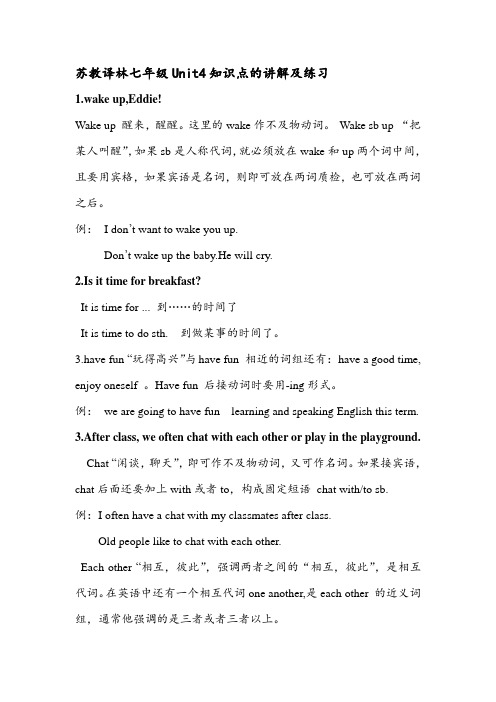
苏教译林七年级Unit4知识点的讲解及练习1.wake up,Eddie!Wake up 醒来,醒醒。
这里的wake作不及物动词。
Wake sb up “把某人叫醒”,如果sb是人称代词,就必须放在wake和up两个词中间,且要用宾格,如果宾语是名词,则即可放在两词质检,也可放在两词之后。
例:I don’t want to wake you up.Don’t wake up the baby.He will cry.2.Is it time for breakfast?It is time for ... 到……的时间了It is time to do sth. 到做某事的时间了。
3.have fun “玩得高兴”与have fun 相近的词组还有:have a good time, enjoy oneself 。
Have fun 后接动词时要用-ing形式。
例:we are going to have fun learning and speaking English this term.3.After class, we often chat with each other or play in the playground. Chat “闲谈,聊天”,即可作不及物动词,又可作名词。
如果接宾语,chat后面还要加上with或者to,构成固定短语chat with/to sb.例:I often have a chat with my classmates after class.Old people like to chat with each other.Each other “相互,彼此”,强调两者之间的“相互,彼此”,是相互代词。
在英语中还有一个相互代词one another,是each other 的近义词组,通常他强调的是三者或者三者以上。
例:My parents love and help each other.They want to know each other’s names.4.I also like playing volleyball.Also 副词,“也”,与too同义,但also一般置于行为动词之前、be动词或助动词之后,too一般置于句尾。
译林版英语七年级上册 Unit 4 My day 知识点
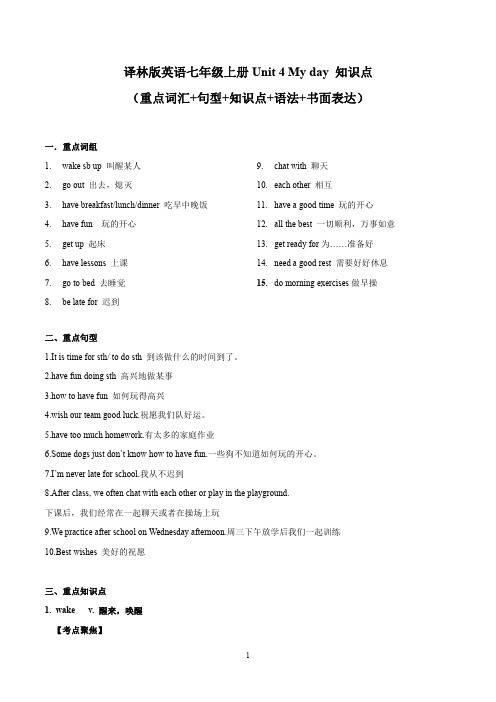
译林版英语七年级上册Unit4My day知识点(重点词汇+句型+知识点+语法+书面表达)一.重点词组1.wake sb up叫醒某人2.go out出去,熄灭3.have breakfast/lunch/dinner吃早中晚饭4.have fun玩的开心5.get up起床6.have lessons上课7.go to bed去睡觉8.be late for迟到9.chat with聊天10.each other相互11.have a good time玩的开心12.all the best一切顺利,万事如意13.get ready for为……准备好14.need a good rest需要好好休息15.do morning exercises做早操二、重点句型1.It is time for sth/to do sth到该做什么的时间到了。
2.have fun doing sth高兴地做某事3.how to have fun如何玩得高兴4.wish our team good luck.祝愿我们队好运。
5.have too much homework.有太多的家庭作业6.Some dogs just don’t know how to have fun.一些狗不知道如何玩的开心。
7.I’m never late for school.我从不迟到8.After class,we often chat with each other or play in the playground.下课后,我们经常在一起聊天或者在操场上玩9.We practice after school on Wednesday afternoon.周三下午放学后我们一起训练10.Best wishes美好的祝愿三、重点知识点1.wake v.醒来,唤醒【考点聚焦】(1)wake的基本意思是“唤醒”或“某事〔物〕唤起了某人的回忆”。
七年级英语上册知识点U4译林

七年级英语上册知识点U4译林第四单元:教育与职业规划在第四单元中,主要介绍了与教育和职业规划有关的知识点。
其中包括了以下内容:教育制度、学科、评估方式、职业规划以及职业选择等方面的内容。
本文将详细介绍这些知识点,帮助读者更好地理解和掌握课本知识。
一、教育制度教育制度是指一国的教育规划、管理和实施。
中国的教育制度由中央和地方两个层面共同组成。
中央层面的教育制度主要包括了国家教育政策、教育部的职能和教育法规等内容;地方层面的教育制度则主要由省、市、县等地方政府负责实施。
此外,教育制度还包括了各级教育机构的设置和管理等方面的内容。
二、学科学科是指对特定领域的研究和探索的有系统的知识和方法。
在学校中,通常将各种知识按照不同的领域划分为不同的学科,如语文、数学、英语、科学、社会等。
每个学科都有自己的课程标准和学习要求,帮助学生掌握相关的知识和技能。
三、评估方式评估方式是指对教育教学过程和结果进行评价的方法和标准。
在学校中,常用的评估方式有考试、测验、作业、实验、口语表达等。
这些方式帮助教师对学生掌握的知识和技能进行评价,以及制定针对性的教学计划。
四、职业规划职业规划是指个人在未来发展方向上的计划和决策。
在初中阶段,学生需要开始了解不同职业的特点和要求,以便在将来做出正确的职业选择。
职业规划的核心在于自我认知和目标制定。
学生可以通过了解自己的兴趣、性格、能力、价值观等方面来确定自己的职业方向,并制定具体的发展计划。
五、职业选择职业选择是指个人最终决定从事哪种职业的行为。
在进行职业选择时,需要考虑自己的兴趣、能力、目标等因素以及市场的需求和发展趋势等外部因素。
合理的职业选择可以帮助个人实现自身的价值和发展目标。
结语:通过对第四单元的介绍,我们深入了解了教育与职业规划方面的知识点。
初中生应该认真学习各个学科的知识,做好评估方式所需的准备,理性规划自己的职业发展,以期未来能够开拓职场并自我实现。
牛津译林版七年级英语上册Unit4重点知识点汇总

牛津译林版七年级英语上册Unit4重点知识点汇总【重点单词】1.wake [weɪk] vi.&vt. 醒,醒来;唤醒2.hill [hɪl] n. 小山3.seldom ['seldəm] adv. 很少,不常4.out [aʊt] adv. 出来,向外,外出5.need [niːd] vt. 需要6.rest [rest] n. 休息,歇息7.just [dʒʌst] adv. 只是8.activity [æk'tɪvɪti] n. 活动9.homework ['həʊmwɜːk] n. 家庭作业ually ['juːʒʊəli] adv. 通常,经常11.never ['nevə] adv. 从不,绝不12.start [stɑːt] vt.&vi. 开始,着手13.quarter ['kwɔːtə] n. 一刻钟14.past [pɑːst] prep. 晚于15.first [fɜːst] adv. 首先16.chat [tʃæt] vi. 聊天,闲聊17.each [iːtʃ] pron. 每人,每个,每件18.other ['ʌðə] pron. 另外,其他19.practise ['præktɪs] vi.&vt. <英>练习;训练20.wish [wɪʃ] n. 希望,祝愿21.life [laɪf] n. 生活;生命22.luck [lʌk] n. 好运,幸运23.museum [mjuː'zɪəm] n. 博物馆24.twice [twaɪs] adv. 两次25.picnic ['pɪknɪk] n. 野餐26.once [wʌns] adv. 一次27.dislike [dɪs'laɪk] n. 不喜爱,厌恶28.reason ['riːz(ə)n] n. 原因,理由29.ready ['redi] adj. 准备好,准备完毕30.learn [lɜːn] vt.&vi. 学,学习,学会31.world [wɜːld] n. 世界【重点短语】1.wake up 醒来2.between...and... 在……和……之间3. go walking in the hills 去山上散步4. need to do sth. 需要做某事5. From Monday to Friday 从周一到周五6. do morning exercises 做早操7. do eye exercises 做眼保健操8. have lessons 上课9. start/begin lessons 开始上课10. do after-school activities 做课外活动11. be never late for work/school 上班/上学从不迟到12. chat with sb. 和某人聊天13. help each other 互相帮助14. play in the playground 在操场上玩15. be in the school volleyball team是校排球队成员16. practise doing sth. 练习做某事17. have a good time doing sth. 做某事很愉快18. all the best 一切顺利,万事如意19. go roller skating 去溜旱冰20. visit a museum 参观博物馆21. get ready for sth. 为某事做好准备22. learn a lot about sth 关于某事了解很多23. too much homework 太多作业24. much too cold/hot 太冷/热【重点句型】1.Some dogs just don’t know how to have fun.有些狗就是不知道怎样玩乐。
译林版七年级上册unit4重点词组及句子翻译归纳
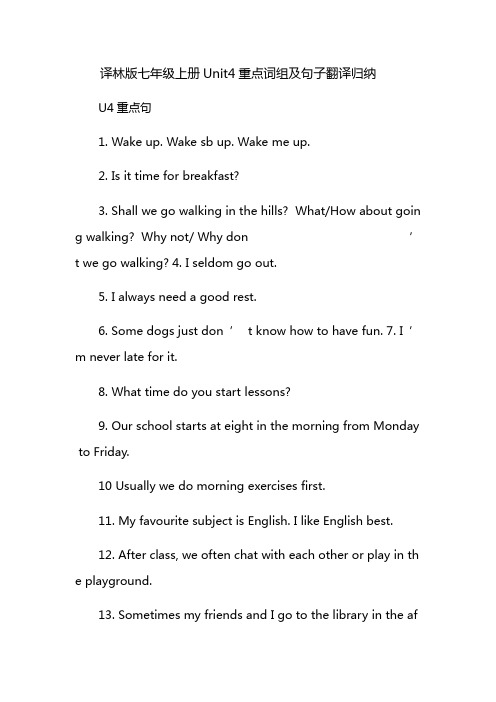
译林版七年级上册Unit4重点词组及句子翻译归纳U4重点句1. Wake up. Wake sb up. Wake me up.2. Is it time for breakfast?3. Shall we go walking in the hills? What/How about going walking? Why not/ Why don’t we go walking? 4. I seldom go out.5. I always need a good rest.6. Some dogs just don’t know how to have fun.7. I’m never late for it.8. What time do you start lessons?9. Our school starts at eight in the morning from Monday to Friday.10 Usually we do morning exercises first.11. My favourite subject is English. I like English best.12. After class, we often chat with each other or play in the playground.13. Sometimes my friends and I go to the library in the afternoon.14. We have a Reading Club.15. We practice after school on Wednesday. Practice doing sth.16. We always have a good time at school. 17. Best wishe s.18. go to the Reading Club19. Millie is a member of /in the school swimming team.20. They have lots of fun on Children’s Day.21. Children in China starts school at 6 years old.22. Thanks for your email. I would like to tell you about m y life here.23. We do not have lessons on Saturday or Sunday.24. I love sports.25. We have a school football match in autumn every year .26. Sandy does not have much time to play tennis. 27. Kit ty goes to her dancing lessons every day. She always dances for half an hour.28. Millie sometimes goes roller skating, but she is not go od at it.29. There is a volleyball match between A and B.30. I hope everyone can come and watch the game.31. Wish our team good luck.wish的用法: wish sb to dowish 从句 would/ could + dowish sb sth Best wishes to sb. make a wish32. How often do you visit a museum? About twice a mo nth.33. I like to go on picnics with my family.34. Morning exercises are good for us. They help us get r eady for the day.35. I can learn a lot about the world. 36. It is fun to draw.37. We always have too much homework! 38. I love lesso ns at school.39. Our teachers are nice and the subjects are interesting.40. I am not tall, so I cannot play it well.U4重点句1. 醒醒。
译林版英语七年级上册unit4知识点
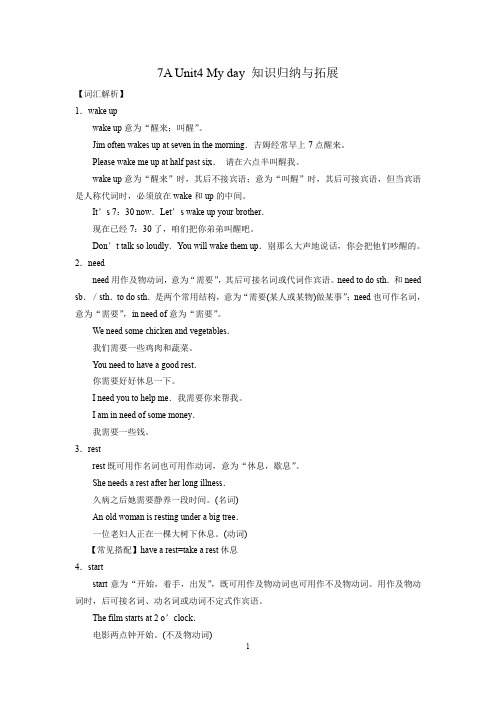
7A Unit4 My day 知识归纳与拓展【词汇解析】1.wake upwake up意为“醒来;叫醒”。
Jim often wakes up at seven in the morning.吉姆经常早上7点醒来。
Please wake me up at half past six.请在六点半叫醒我。
wake up意为“醒来”时,其后不接宾语;意为“叫醒”时,其后可接宾语,但当宾语是人称代词时,必须放在wake和up的中间。
It’s 7:30 now.Let’s wake up your brother.现在已经7:30了,咱们把你弟弟叫醒吧。
Don’t talk so loudly.You will wake them up.别那么大声地说话,你会把他们吵醒的。
2.needneed用作及物动词,意为“需要”,其后可接名词或代词作宾语。
need to do sth.和need sb./sth.to do sth.是两个常用结构,意为“需要(某人或某物)做某事”;need也可作名词,意为“需要”,in need of意为“需要”。
We need some chicken and vegetables.我们需要一些鸡肉和蔬菜。
You need to have a good rest.你需要好好休息一下。
I need you to help me.我需要你来帮我。
I am in need of some money.我需要一些钱。
3.restrest既可用作名词也可用作动词,意为“休息,歇息”。
She needs a rest after her long illness.久病之后她需要静养一段时间。
(名词)An old woman is resting under a big tree.一位老妇人正在一棵大树下休息。
(动词)【常见搭配】have a rest=take a rest休息4.startstart意为“开始,着手,出发”,既可用作及物动词也可用作不及物动词。
译林牛津重点初中英语7年级上册(7A)第四单元Unit4知识点汇总
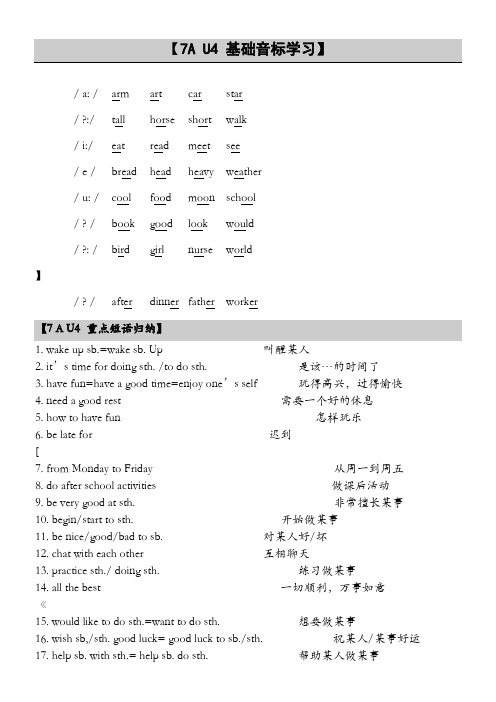
/ a: / arm art car star/ ?:/ tall horse short walk/ i:/ eat read meet see/ e / bread head heavy weather/ u: / cool food moon school/ ? / book good look would/ ?: / bird girl nurse world】/ ? / after dinner father worker【7 A U4 重点短语归纳】1. wake up sb.=wake sb. Up 叫醒某人2. it’s time for doing sth. /to do sth. 是该…的时间了3. have fun=have a good time=enjoy one’s self 玩得高兴,过得愉快4. need a good rest 需要一个好的休息5. how to have fun 怎样玩乐6. be late for 迟到[7. from Monday to Friday 从周一到周五8. do after school activities 做课后活动9. be very good at sth. 非常擅长某事10. begin/start to sth. 开始做某事11. be nice/good/bad to sb. 对某人好/坏12. chat with each other 互相聊天13. practice sth./ doing sth. 练习做某事14. all the best 一切顺利,万事如意《15. would like to do sth.=want to do sth. 想要做某事16. wish sb,/sth. good luck= good luck to sb./sth. 祝某人/某事好运17. help sb. with sth.= help sb. do sth. 帮助某人做某事18. go roller skating 溜旱冰19. between Sunshine Middle School and Moonlight Middle School在阳光中学和月光中学之间20. Sunshine Sports Centre 阳光体育中心21. at/on weekends=at/on the weekends 在周末[22. first=at first=first at all 首先23. visit the museums 参观博物馆24. twice a month 一个月两次25. go on a picnic=have a picnic 去野营26. once a week 一个星期一次27. go on a class/autumn trip 去班级/秋天之旅28. be good/bad for sb. 对某人有利/害29. get ready for sth. 为某事做好准备~30. learn a lot about sth.=know much about sth. 知道很多有关某事【7A U4 重点语法点拨】时间介词(at, in ,on) 的用法1.at(1)时间的一点、时刻等。
译林版七年级英语上册第四单元知识点总结

译林版七年级英语上册第四单元知识点总结Unit 4 Vocabulary Summary from Grade 7 of the n of n Forest1.Wake up: to e us after sleeping。
Wake sb up: to make XXX2.Go out: to leave a place: XXX4.XXX5.Need a good rest: to require a d of n6.Need to do sth: to require an n to be XXX7.Go walking: to take a walk8.In the hills: XXX XXX9.How to: in what way or XXX10.Have fun: to enjoy oneself。
Have fun doing sth: to enjoy a particular activity11.Do morning exercises: to perform physical activities in the morning12.Have lessons: XXX13.Do after-school activities: XXX activities14.Do homework: XXX15.Be late for: to arrive after the led time16.Start lessons: to begin a class17.At a quarter past eight: at 8:1518.XXX: at 7:4519.At half past seven: at 7:30XXX Structures:1.Shall we go walking in the hills。
Would you like to take a walk in the mountains?2.---When do you go to school every day。
七年级上册英语译林版U4知识点

七年级上册英语译林版U4知识点英语译林版七年级上册U4知识点英语译林版七年级上册U4是学习英语语法的重要单元,本单元主要涉及代词、数词、冠词以及一些常用的形容词和副词等知识点,下面将逐一介绍。
一、代词1.人称代词人称代词分为主格和宾格两种形式。
主格代词可以作主语、表语和同位语,而宾格代词则可以作宾语、间宾和宾补。
例如:主格代词:I, you, he, she, it, we, they宾格代词:me, you, him, her, it, us, them2.物主代词物主代词表示所属关系,分为形容词性和名词性。
形容词性物主代词作定语;名词性物主代词则作主语、宾语或表语等。
例如:形容词性物主代词:my, your, his, her, its, our, their名词性物主代词:mine, yours, his, hers, its, ours, theirs3.反身代词反身代词表示动作的发出者或受事者与动作的承受者是同一人。
常见的反身代词有:myself, yourself, himself, herself, itself, ourselves, yourselves, themselves。
例如:I can wash myself.She hurt herself while playing basketball.二、数词数词指代特定的数字或数字序列,分为基数词和序数词两种形式。
基数词表示数量,如one, two, three等;序数词表示顺序,如first, second, third等。
例如:基数词:I have three pencils.序数词:I came in first in the race.三、冠词冠词分为不定冠词和定冠词两种。
不定冠词表示泛指,定冠词表示特指。
例如:不定冠词:I saw a bird in the tree.定冠词:The bird in the tree is very colorful.四、形容词和副词形容词和副词用来修饰名词和动词等,形容词主要表达名词的性质和特征,副词则表示动作的模式、时间、地点和程度等。
Unit4重点内容梳理江苏省常州市牛津译林版七年级英语上册

常州市2023年牛津译林版7A U4 重点内容梳理一.重点词汇1.你可以在湖边看到许多小山。
You can see some green hills around the lake.名词小山hill复数hills 高山mountain两个词的区别词组在湖边around the lake2.不要对你的儿子如此生气,他仅仅是一个孩子。
Don't be so angry with your son ,he is just a child.动词原形放在句首时,祈使句,用动词原形开头否定是don’t+动词原形开头表示不要做某事词组对某人生气be angry with somebody仅仅只是一个孩子just a child复数孩子children3.每个人需要在这周完成所有的工作。
Everyone needs to finish all the work this week.不定代词everyone做主语,每个人是单数,后面的谓语动词用三单动词用法需要做某事need to do something词组完成工作finish the work4.在大部分的初中,一节课持续45分钟。
Class lasts three quarters in most middle schools.动词持续last45分钟three quarters名词quarter 15分钟是一刻钟三个一刻钟three quarters 注意名词复数形式5.做眼保健操在看电视之后对眼睛有好处。
Doing eye exercises after watching TV for sometime is good for our eyes. 词组,做眼保健操doing eye exercises这里的exercise名词操可数名词exercise两个词性动词和名词可数名词操做眼保健操do eye exercises、做早操do morning exercises练习题做英语练习题do English exercises名词锻炼不可数6.我们的学校和他们的完全不同,他们的学校小的多。
江苏牛津译林七年级上册Unit 4基础知识

I would like to go shopping at two o’clock.
10.Good luck.(lucky形容词)
祝我们队好运!
Good luck to our team.
11.be good for对...有利
早操对我们有利。
Morning exercises are good for us.
7.Andy ______ (需要) some more help.
8.This__________ (博物馆) has many art treasures.
9.The children can __________ (学会) a lot from their teacher.
10.I would like to tell my penfriend about my school __________ (生活) in Shanghai.
12. help sb. with sth. = help sb. (to) do sth.
他帮助我写作业。
He helps me with my homework.
He helps me (to) do my homework.
13.get ready for为......作准备
get ready for意为“为......做准备”,是固定词组。get ready后还可以跟to do形式。
We will have funlearningto speak English well.学说英语会很有趣的。
They have funplayinggames after class.他们在课后愉快地做游戏。
4. need sth./ to do sth需要某事/做某事
苏教牛津译林版初中英语七年级上册7AU4TaskPPT课件

3.I can learn a lot about the world.我能多多地了解这个
世界。 learn不及物动词,意思为“学,学习”。 learn a lot about 学习许多有关----的知识; learn to do sth.学习做某事; learn from sb.向某人学习。
如:人们想更多地了解关于月球的事。 People want to _le_a_r_n_m__o_re__a_b_o_u_t _ the moon.
Help Millie complete her diary entry in Part B.
I love ____le_s_so_n_s____ at school. Our teachers are __n_ic_e___ and the subjects are i_n_te_r_es_t_in_g_____. I love r_e_a_d_in_g___ too. From it .I can learn a lot about ___t_h_e _w_o_rl_d____.
翻译句子
1.每天做早操,有助于你的健康。
Doing morning exercises__i_s_g_o__o_d__fo_r__y_o_u_r__h_e_a_l.th
2.我们不应该看太多的电影,也不应该看太多的电视。
We shouldn’t watch__t_o_o_m__a_n_y__f_i_lm__s__and we shouldn’t watch t_o_o_m__u_c_h____TV,either.
汤姆和杰姆互相学习。 Tom and Jim __le_a_r_n_f_ro_m__e_a_c_h__o_th_e_r__. 我们在课上从我们老师那学到了许多。 We __l_e_ar_n__a_l_o_t _fr_o_m___our teachers in class. 学习跳舞是有趣的。 It’s fun to _l_e_ar_n__to__d_a_n_ce____. 还可作及物动词,意思为“学习,学会”,后面直接跟宾语
译林初一上学期第四单元知识点
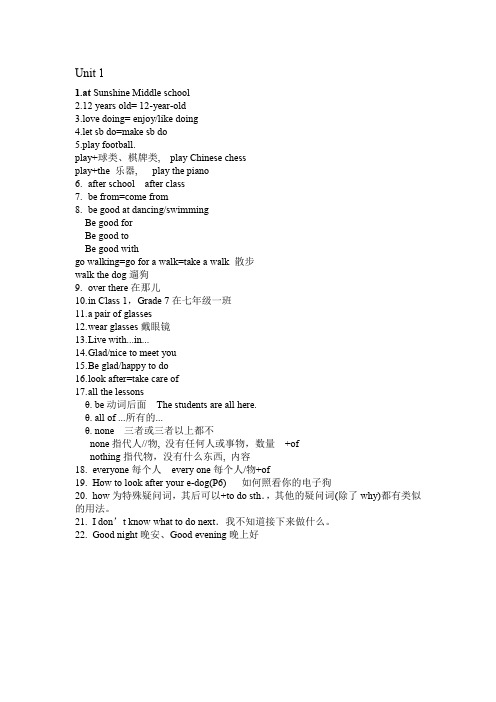
1.at Sunshine Middle school2.12 years old= 12-year-old3.love doing= enjoy/like doing4.let sb do=make sb do5.play football.play+球类、棋牌类, play Chinese chessplay+the 乐器, play the piano6.after school after class7.be from=come from8.be good at dancing/swimmingBe good forBe good toBe good withgo walking=go for a walk=take a walk 散步walk the dog遛狗9.over there在那儿10.i n Class 1,Grade 7在七年级一班11.a pair of glasses12.w ear glasses戴眼镜13.L ive with...in...14.G lad/nice to meet you15.B e glad/happy to do16.l ook after=take care of17.a ll the lessonsθ. be动词后面The students are all here.θ. all of ...所有的...θ. none 三者或三者以上都不none指代人//物, 没有任何人或事物,数量+ofnothing指代物,没有什么东西, 内容18.everyone每个人every one每个人/物+of19.How to look after your e-dog(P6) 如何照看你的电子狗20.how为特殊疑问词,其后可以+to do sth.,其他的疑问词(除了why)都有类似的用法。
21.I don’t know what to do next.我不知道接下来做什么。
- 1、下载文档前请自行甄别文档内容的完整性,平台不提供额外的编辑、内容补充、找答案等附加服务。
- 2、"仅部分预览"的文档,不可在线预览部分如存在完整性等问题,可反馈申请退款(可完整预览的文档不适用该条件!)。
- 3、如文档侵犯您的权益,请联系客服反馈,我们会尽快为您处理(人工客服工作时间:9:00-18:30)。
wake vi.& vt.醒,醒来;唤醒wake up醒来shall v.(表示提出或征求建议)hill n. 小山seldom adv. 很少,不常out adv.(从…里)出来,向外,外出go out出去need vt.需要rest n.休息,歇息just adv.只是have lessons上课after-school adj.课外的,课后的activity n.活动homework n. 家庭作业go to bed去睡觉usually adv.通常,经常never adv.从不,绝不be late for迟到start vt.& vi.开始,着手quarter n.一刻钟past prep.晚于first adv.首先chat vi.聊天,闲聊each det.& pron.每人,每个,每件other pron.另外,其他each other pron.互相,彼此practise vi.& vt.<英>练习;训练=<美>practicehave a good time过得愉快,玩得高兴wish n.希望,祝愿 vt.希望,祝愿would modal v.(表示客气地建议或邀请)would like(=\'d like)想,愿意life n.(pl. lives)生活;生命roller skating n.溜旱冰luck n.好运,幸运museum n. 博物馆twice adv.两次picnic n.野餐once adv.一次dislike n.不喜爱,厌恶reason n.原因,理由ready adj.准备好,准备完毕learn vt.& vi.学,学习,学会world n.世界get ready for为…准备好have breakfast吃早饭have lunch吃中饭in the morning在上午in the afternoon在下午in the evening在晚上02U n i t4知识梳理【重点短语】1. wake up 醒来2.wake sb. up 叫醒某人3. It’s time for sth. / It’s time (for sb.) to do sth.是(某人)干某事的时候了4. go walking in the hills 去山上散步5. seldom go out 很少外出6. need a good rest =need to have a good rest需要好好休息7. need to do sth. 需要做某事8. write to her online friend 写信给她的网友9. do morning exercises 做早操10. do eye exercises做眼保健操11. do some exercise 锻炼12. have lessons 上课13. start (begin) lessons 开始上课14. do after-school activities 做课外活动15. be never late for work / school 上班/ 上学从不迟到16. one of ….. …….之一。
后接可数名词复数或复数代词17. be all nice to sb. 都对某人很好18. chat with sb. 和某人聊天19. chat with each other 互相聊天20. help each other 互相帮助21. play in the playground 在操场上玩22. be in the school volleyball team是校排球队成员=be a member of the school volleyball team23. practise after school 放学后训练practise doing sth. 练习/训练做某事24. on Wednesday afternoon 在周三下午25. have a good time doing sth=have fun doing sth.做某事过得愉快26. in spring / s ummer / autumn / winter 在春(夏、秋、冬)季27. at 6 years old =at 6 在六岁=at the age of 628. all the best 一切顺利,万事如意29. have much time to do sth.有很多时间做某事30. have no time to do sth. 没有时间做某事31. go to her dancing lessons 去上舞蹈课32. dance for half an hour 跳舞半小时33. go roller skating 去溜旱冰34. go walking 去散步35. between...and... 在...和...之间36. visit the museum 参观博物馆37. go on picnics with my family twice a month一个月两次和我家人去野餐38. at noon 在中午39. at night 在夜里40. at work 在工作41. be good for sb.对...有益42. be bad for sb. 有…..害43. help sb. get ready for sth 帮助某人为...做好准备44. get ready to do sth 准备好做某事=be ready to do sth.45. learn a lot about sth 关于某事了解很多46. learn more about sth. 关于某事了解更多47. too much homework (to do) 要做太多作业48. too many lessons 太多课49.much too cold (hot)太冷(热)【重点句型】1. Some dogs just don’t know how to have fun.有些狗就是不知道怎样玩乐。
2. What time do you start lessons?你们什么时候开始上课?3. Our lessons begin at a quarter past eight.我们的课于8:15开始。
4. We have a Reading Club.我们有一个阅读俱乐部。
5. I also like playing volleyball.我也喜欢打排球。
6. We always have a good time at school.我们在学校总是过得很开心。
7. Millie seldom chats with her friends after class.Millie很少与朋友在课后闲聊。
8. I would like to tell you about my life here.我想告诉你我在这儿的生活。
9. We do not have lessons on Saturday or Sunday.我们在周六和周日不上课。
10. How often do they exercise?他们多久锻炼一次?11. I hope everyone can come and watch the game.我希望每个人能来看比赛。
12. Wish our team good luck!祝我们队好运!13. They help us get ready for the day.他们帮助我们为一天做好准备。
【重点语法】时间介词(at, in ,on) 的用法1. at(1)时间的一点、时刻等。
如:They came home at seven o’clock.(at night, at noon, at midnight, at ten o’clock, at daybreak, at dawn).(2)后面接表示岁数的词。
Children inChinastart school at 6 years old.(3)较短暂的一段时间。
可指某个节日或被认为是一年中标志大事的日子。
如:He went home at Christmas (at New Year, at the Spring Festival).2. in(1)在某个较长的时间(如世纪、朝代、年、月、季节以及泛指的上午、下午或傍晚等)内。
如: in 2004, in March, in spring, in the morning, in the evening, etc(2)在一段时间之后, 常用于将来时。
He will arrive in two hours.These products will be produced in a month.3. on(1)具体的时日和一个特定的时间,如某日、某节日、星期几等。
如: On Christmas Day(On May 4th), there will be a celebration.(2)在某个特定的早晨、下午或晚上。
如:He arrived at 10 o’clock on the night of the 5th.The boy was born on a cold winter morning.(3)准时,按时。
如:If the train should be on time, I should reach home before dark.。
